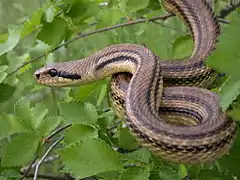| Elaphe[1] | |||
| Fitzinger, 1833[2] | |||
 Przedstawiciel rodzaju – Elaphe quatuorlineata | |||
| Systematyka | |||
| Domena | |||
|---|---|---|---|
| Królestwo | |||
| Typ | |||
| Podtyp | |||
| Podgromada | |||
| Rząd | |||
| Podrząd | |||
| Infrarząd | |||
| Nadrodzina |
Colubroidea | ||
| Rodzina | |||
| Podrodzina | |||
| Rodzaj |
Elaphe | ||
| Typ nomenklatoryczny | |||
|
Elaphe parreysii Fitzinger, 1833 (= Coluber quatuorlineatus Bonnaterre, 1790) | |||
| Synonimy | |||
|
| |||
| Gatunki | |||
| |||

Połoz amurski (E. schrenckii)
Elaphe – rodzaj węży z podrodziny Colubrinae w rodzinie połozowatych (Colubridae).
Zasięg występowania
Rodzaj obejmuje gatunki występujące w Bułgarii, Rumunii, Mołdawii, Chorwacji, Serbii, Słowenii, Bośni i Hercegowinie, Macedonii Północnej, Albanii, we Włoszech, w Grecji, na Ukrainie, w Rosji, Turcji, Syrii, Izraelu, Gruzji, Armenii, Azerbejdżanie, Kazachstanie, Kirgistanie, Tadżykistanie, Uzbekistanie, Turkmenistanie, Iranie, Iraku, Afganistanie, Mongolii, Chinach, Indiach, Nepalu, Bhutanie, Mjanmie, na Tajwanie, w Tajlandii, Laosie, Kambodży, Wietnamie, Malezji, Indonezji, Korei i Japonii[8].
Systematyka
Etymologia
- Elaphe: gr. ελαφη elaphē „skóra jelenia”, od ελαφος elaphos „jeleń”[9].
- Leptophidium: λεπτος leptos „smukły, drobny”[10]; οφιδιον ophidion „mały wąż”, zdrobnienie od οφις ophis, οφεως opheōs „wąż”[11]. Gatunek typowy: Leptophidium dorsale Hallowell, 1860 (= Coluber quadrivirgatus Boie, 1826).
- Phyllophis: φυλλον phullon „liść”[12]; οφις ophis, οφεως opheōs „wąż”[11]. Gatunek typowy: Phyllophis carinata Günther, 1864.
- Spaniopholis: gr. σπανιος spanios „rzadki, skąpy”[13]; φολις pholis, φολιδος pholidos „rogowa łuska”[14]. Gatunek typowy: Spaniopholis souliei Mocquard, 1897 (= Phyllophis carinata Günther, 1864).
- Orthriophis: gr. ορθρος orthros „świt”; οφις ophis, οφεως opheōs „wąż”[6]. Gatunek typowy: Cynophis moellendorffi Boettger, 1886.
- Martinekea: Maryann Martinek, major Australian Army[7]. Gatunek typowy: Spilotes hodgsonii Günther, 1860.
Podział systematyczny
Do rodzaju należą następujące gatunki[8]:
- Elaphe anomala
- Elaphe bimaculata
- Elaphe cantoris
- Elaphe carinata
- Elaphe climacophora – połoz japoński
- Elaphe davidi
- Elaphe dione
- Elaphe hodgsoni
- Elaphe moellendorffi
- Elaphe quadrivirgata
- Elaphe quatuorlineata
- Elaphe sauromates
- Elaphe schrenckii – połoz amurski
- Elaphe taeniura – połoz smugooki
- Elaphe urartica[15]
- Elaphe zoigeensis
Przypisy
- ↑ Elaphe, [w:] Integrated Taxonomic Information System (ang.).
- ↑ J.G. Wagler: Descriptiones et icones amphibiorum. Monachii, Stuttgartiae et Tubingae: Sumtibus J.G. Cotttae, 1833, s. ryc. 27. (łac.).
- ↑ E. Hallowell. Report upon the Reptilia of the North Pacific Exploring Expedition, under command of Capt. John Rogers, U. S. N.. „Proceedings of the Academy of Natural Sciences of Philadelphia”. 12 (1860), s. 497, 1861. (ang.).
- ↑ A.C.L.G. Günther: The reptiles of British India. London: Pub. for the Ray society by R. Hardwicke, 1864, s. 295. (ang.).
- ↑ F. Mocquard. Notes herpétologiques. „Bulletin du Muséum d’Histoire Naturelle”. 3, s. 216, 1897. (fr.).
- 1 2 U. Utiger, N. Helfenberger, B. Schätti, C. Schmidt, M. Ruf & V. Ziswiler. Molecular systematics and phylogeny of Old World and New World ratsnakes, Elaphe Auct., and related genera (Reptilia, Squamata, Colubridae). „Russian Journal of Herpetology”. 9 (2), s. 110, 2002. (ang.).
- 1 2 R. Hoser. A taxonomic revision of the Colubrinae genera Zamenis and Orthriophis with the creation of two new genera (Serpentes: Colubridae). „Australasian Journal of Herpetology”. 11, s. 61–62, 2012. (ang.).
- 1 2 P. Uetz & J. Hallermann: Genus: Elaphe. The Reptile Database. [dostęp 2019-03-25]. (ang.).
- ↑ Jaeger 1944 ↓, s. 79.
- ↑ Jaeger 1944 ↓, s. 122.
- 1 2 Jaeger 1944 ↓, s. 154.
- ↑ Jaeger 1944 ↓, s. 174.
- ↑ Jaeger 1944 ↓, s. 216.
- ↑ Jaeger 1944 ↓, s. 172.
- ↑ Daniel Jablonski, Oleg V. Kukushkin, Aziz Avcı, Sabina Bunyatova, Yusuf Kumlutaş, Çetin Ilgaz, Ekaterina Polyakova, Konstantin Shiryaev, Boris Tuniyev i David Jandzik. The biogeography of Elaphe sauromates (Pallas, 1814), with a description of a new rat snake species. „PeerJ”. 7:e6944, 2019. DOI: 10.7717/peerj.6944. (ang.).
Bibliografia
- Edmund C. Jaeger, Source-book of biological names and terms, wyd. 1, Springfield: Charles C. Thomas, 1944, s. 1–256, OCLC 637083062 (ang.).
This article is issued from Wikipedia. The text is licensed under Creative Commons - Attribution - Sharealike. Additional terms may apply for the media files.